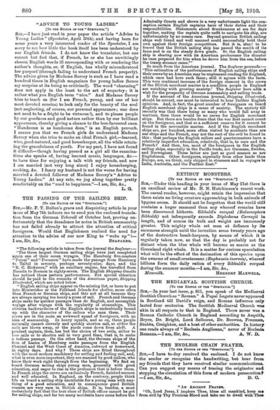"ADVICE TO YOUNG LA.DLES."
[To TIM EDITOR Ol THE " SPHOTATOR..] SIR,—I have just read in your paper the article "Advice to Young Ladies " (Spectator, April 30th), and having been for some years a very interested reader of the Spectator, I am sorry to see how little the book itself has been understood by our English friends. I do not know the translator, but one cannot but feel that, if French, he or she has unwittingly chosen English words ill corresponding with or rendering the author's thoughts, or, if English, has wholly misunderstood her purport'(through failing to understand French properly). The advice given by Madame Sarcey is such as I have read a hundred times in English magazines for young ladies (hence my surprise at its being so criticised). The word "charming" does not apply in the least to the art of coquetry ; it is rather what you English term "nice." And Madame Sarcey tries to teach us (for I am French, young, and one of her most devoted cousins) to look only for the beauty of the soul (not neglecting, of course, our personal appearance ; one does not need to be a fright to be virtuous !), and to please people by our goodness and good nature rather than by our brilliant appearance, thereby giving a chance to the less-favoured ones. " Handsome is as handsome does," is an English proverb. I assure you that we French girls do understand Madame Sarcey when she tries to make an ideal French girl,—learned, wise, good-natured, and good housekeeper, all the while retain- ing the gracefulness of youth. For my part, I have not found it difficult—though having passed as a girl all the examina- tions she speaks of, having learned music, languages, &c.— to have time for enjoying a talk with my friends, and now I am married (not very long since) I enjoy housekeeping, cooking, &c. I fancy my husband is not the worse for having married a devoted follower of Madame Sarcey's " Advice to Young Ladies." At any rate, we jog along together pretty comfortably on the "road to happiness."—I am, Sir, &c.,
L. G.














































 Previous page
Previous page